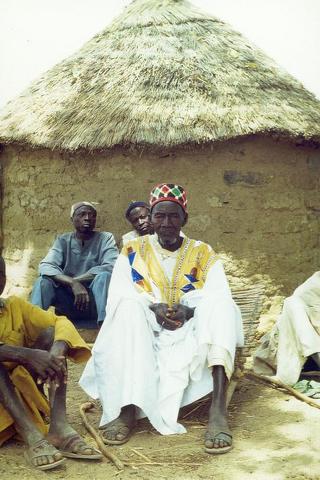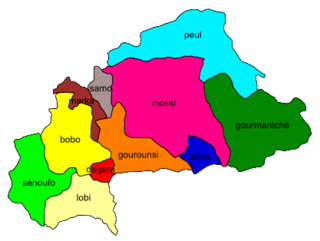
Burkina Faso is a landlocked country in West Africa. It covers an area of 274,223 km2 (105,878 sq mi), bordered by Mali to the northwest, Niger to the northeast, Benin to the southeast, Togo and Ghana to the south, and Ivory Coast to the southwest. As of 2021, the country had an estimated population of 23,674,480. Previously called Republic of Upper Volta (1958–1984), it was renamed Burkina Faso by President Thomas Sankara. Its citizens are known as Burkinabè, and its capital and largest city is Ouagadougou.

Burkina Faso's 22.1 million people belong to two major West African cultural groups: the Gur (Voltaic) and the Mandé. The Voltaic are far more numerous and include the Mossi, who make up about one-half of the population. The Mossi claim descent from warriors who migrated to present-day Burkina Faso and established an empire that lasted more than 800 years. Predominantly farmers, the Mossi are still bound by the traditions of the Mogho Naba, who hold court in Ouagadougou.

The music of Burkina Faso includes the folk music of 60 different ethnic groups. The Mossi people, centrally located around the capital, Ouagadougou, account for 40% of the population while, to the south, Gurunsi, Gurma, Dagaaba and Lobi populations, speaking Gur languages closely related to the Mossi language, extend into the coastal states. In the north and east the Fulani of the Sahel preponderate, while in the south and west the Mande languages are common; Samo, Bissa, Bobo, Senufo and Marka. Burkinabé traditional music has continued to thrive and musical output remains quite diverse. Popular music is mostly in French: Burkina Faso has yet to produce a major pan-African success.

The Mande languages are a group of languages spoken in several countries in West Africa by the Mandé peoples. They include Maninka (Malinke), Mandinka, Soninke, Bambara, Kpelle, Jula (Dioula), Bozo, Mende, Susu, and Vai. There are around 60 to 75 languages spoken by 30 to 40 million people, chiefly in Burkina Faso, Mali, Senegal, the Gambia, Guinea, Guinea-Bissau, Sierra Leone, Liberia, Ivory Coast and also in southern Mauritania, northern Ghana, northwestern Nigeria and northern Benin.

The Mossi are a Gur ethnic group native to modern Burkina Faso, primarily the Volta River basin. The Mossi are the largest ethnic group in Burkina Faso, constituting 52% of the population, or about 11.1 million people. The other 48% of Burkina Faso's population is composed of more than 60 ethnic groups, mainly the Gurunsi, Senufo, Lobi, Bobo, Bissa and Fulani. The Mossi speak the Mòoré language.

Mooré, also called More or Mossi, is a Gur language of the Oti–Volta branch and one of four official languages of Burkina Faso. It is the language of the Mossi people, spoken by approximately 6.46 million people in Burkina Faso, Ghana, Cote d’Ivoire, Benin, Niger, Mali, Togo and Senegal as a native language, but with many more L2 speakers. Mooré is spoken as a first or second language by over 50% of the Burkinabè population and is the main language in the capital city of Ouagadougou. It is closely related to Dagbani.
The Wangara are a subgroup of the Soninke who later became assimilated merchant classes that specialized in both Trans Saharan and Secret Trade of Gold Dust. Their diaspora operated all throughout West Africa Sahel-Sudan. Fostering regionally organized trade networks and Architecture projects. But based in the many Sahelian and Niger-Volta-Sene-Gambia river city-states. Particularly Dia, Timbuktu, Agadez, Kano, Gao, Koumbi Saleh, Guidimaka, Salaga, Kong, Bussa, Bissa, Kankan, Jallon, Djenné as well as Bambouk, Bure, Lobi, and Bono State goldfields and Borgu. They also were practicing Muslims with a clerical social class (Karamogo), Timbuktu Alumni political advisors, Sufi Mystic healers and individual leaders (Marabout). Living by a philosophy of mercantile pacifism called the Suwarian Tradition. Teaching peaceful coexistence with non-Muslims, reserving Jihad for self-defence only and even serving as Soothsayers or a "priesthood" of literate messengers for non-Muslim Chiefdoms/Kingdoms. This gave them a degree of control and immense wealth in lands where they were the minority. Creating contacts with almost all West African religious denominations. A group of Mande traders, loosely associated with the Kingdoms of the Sahel region and other West African Empires. Such as Ghana, Mali, Songhai, Bono State, Kong, Borgu, Dendi, Macina, Hausa Kingdoms & the Pashalik of Timbuktu. Wangara also describes any land south of Timbuktu and Agadez. The Bilad-Al-Sudan or Bilad-Al-Tibr, "Land of Black" or "Gold."

Ghana is a multilingual country in which about eighty languages are spoken. Of these, English, which was inherited from the colonial era, is the official language and lingua franca. Of the languages indigenous to Ghana, Akan is the most widely spoken in the south. Dagbani is most widely spoken in the north.

The Mossi Kingdoms, sometimes referred to as the Mossi Empire, were a group of powerful kingdoms in modern-day Burkina Faso which dominated the region of the upper Volta river for hundreds of years. The largest Mossi kingdoms was that of Ouagadougou and the king of Ouagadougou known as the Mogho Naaba, or King of All the World, serves as the Emperor of all the Mossi. The first kingdom was founded when Dagomba warriors from the region that is present-day Ghana and Mandé warriors moved into the area and intermarried with local people. Centralization of the political and military powers of the kingdoms begin in the 13th century and led to conflicts between the Mossi kingdoms and many of the other powerful states in the region. In 1896, the French took over the kingdoms and created the French Upper Volta which largely used the Mossi administrative structure for many decades in governing the colony.
Articles related to Burkina Faso include:
The Gurunsi, or Grunshi, are a set of related ethnic groups inhabiting northern Ghana and south and central Burkina Faso.
Busa, or Bisã, is the Mande language of the former Borgu Emirate in northwestern Nigeria and northern Benin. It is called Busanci in Hausa, and has also been called Zugweya.

Burkina Faso is a multilingual country. An estimated 70 languages are spoken there, of which about 66 are indigenous. Mooré is spoken by about 52.5% of the population, mainly in the central region around the capital, Ouagadougou.

Bissa, is a Mande ethnic group of south-central Burkina Faso, northeastern Ghana and the northernmost tip of Togo. Their language, Bissa, is a Mande language that is related to, but not the same as, a cluster of languages in the old Borgu Kingdom area of Northeast Benin and Northwest Nigeria, including Busa, Boko, and Kyenga. An alternate name for the Bissa is Busansi which is used by the Mossi people and Kusasi people or Busanga.

The Bobo are a Mande ethnic group living primarily in Burkina Faso, with some living north in Mali. Bobo is also a shortened name of the second-largest city in Burkina Faso, Bobo-Dioulasso.
Bariba, also known as Baatonum, is the language of the Bariba people and was the language of the state of Borgu. The native speakers are called Baatombu, Barba, Baruba, Berba and a number of various other names and spellings.
Boko, or Boo, is a Mande language of Benin and Nigeria.

The art of Burkina Faso is the product of a rich cultural history. In part, this is because so few people from Burkina have become Muslim or Christian. Many of the ancient artistic traditions for which Africa is so well known have been preserved in Burkina Faso because so many people continue to honor the ancestral spirits, and the spirits of nature. In great part they honor the spirits through the use of masks and carved figures. Many of the countries to the north of Burkina Faso had become predominantly Muslim, while many of the countries to the south of Burkina Faso are heavily Christian. In contrast many of the people of Burkina Faso continue to offer prayers and sacrifices to the spirits of nature and to the spirits of their ancestors. The result is that they continue to use the sorts of art that we see in museums in Europe and America.
The Eastern Mande languages are a branch of the Mande languages spoken in seven areas: northwest Burkina Faso, the border region of northern Benin and Nigeria, and one language, Bissa, also spoken in Ghana, Togo, and Ivory Coast and the Samo languages also spoken in Mali.











